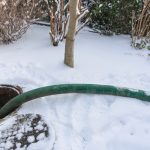 Winter can bring about some unique challenges for homeowners, especially when it comes to their septic systems. One common issue that many homeowners face during the winter months is a frozen septic tank. When a septic tank freezes, it can lead to a variety of problems, such as backed up sewage and even a damaged tank. To prevent these issues, it’s important to take proper precautions and ensure that your septic tank remains unfrozen throughout the winter. In this blog post, we will outline some effective tips to help you prevent your septic tank from freezing.
Winter can bring about some unique challenges for homeowners, especially when it comes to their septic systems. One common issue that many homeowners face during the winter months is a frozen septic tank. When a septic tank freezes, it can lead to a variety of problems, such as backed up sewage and even a damaged tank. To prevent these issues, it’s important to take proper precautions and ensure that your septic tank remains unfrozen throughout the winter. In this blog post, we will outline some effective tips to help you prevent your septic tank from freezing.
1. Insulate your septic tank
Insulating your septic tank is one of the most effective ways to prevent freezing. Start by adding a layer of straw or hay around your tank. This natural insulation material will create a barrier between the cold air and the tank, helping to retain heat. It’s also a good idea to cover the top of the tank with a layer of mulch or another insulating material. This will further protect the tank from extreme temperatures and reduce the risk of freezing.
2. Redirect roof runoff
During winter, the water from melting snow or rain can contribute to freezing of the septic tank. To prevent this, consider redirecting the roof runoff away from your septic system. Install downspout extensions or a French drain to carry the water away from the drain field and any other areas where it can accumulate and freeze. Proper drainage will help keep the soil around your tank warmer and reduce the chances of freezing.
3. Use a septic tank heater
If you live in an area with extremely cold winters, using a septic tank heater can be a wise investment. These heaters are designed specifically to prevent freezing and can be installed directly in your septic tank. They work by emitting a small amount of heat, keeping the temperature of the tank above freezing point. It’s recommended to consult with a professional installer to determine the appropriate size and type of heater for your specific septic system.
4. Request regular septic tank maintenance
Regular maintenance is crucial to the health and functionality of your septic tank, especially in the winter months. Schedule routine inspections and pumping with a professional septic tank service provider. They will assess the condition of your tank, clean out any accumulated sludge, and check for any potential issues. This proactive approach will ensure that your septic tank remains in optimal condition and reduce the risk of freezing.
5. Conserve water usage
Conserving water usage during the winter can also be helpful in preventing the freezing of your septic tank. The less water you send into your septic system, the less strain it puts on the tank and the less likely it is to freeze. Be mindful of your water usage and avoid practices such as excessive flushing, long showers, or running the dishwasher too frequently. Additionally, fix any leaks or drips promptly to avoid any unnecessary water flow into the system.
Summary
Preventing your septic tank from freezing during the winter months requires proactive measures and some foresight. By insulating your tank, redirecting roof runoff, using a septic tank heater, scheduling regular maintenance, and conserving water usage, you can significantly reduce the risk of your septic tank freezing. Remember, a frozen septic tank can lead to costly repairs and inconvenience, so it’s always better to take preventive actions. Taking care of your septic system throughout the year will ensure its longevity and keep your household running smoothly even during the coldest months.
Need Septic Contractors in Bethel, OH?
Gullett Sanitation Services, Inc. offers mobile de-watering of sludge and slurries in and around Bethel, OH, utilizing Roediger belt filter presses, as well as services and repairs on all major brands of home aeration systems. We also work with jet aeration and cleaning for sewer system lines (up to 8 inches in diameter), permits and consultation for biosolids, the transportation of non-hazardous wastewater, sludge removal from all types of waste lagoons, service and repairs on residential sewer systems, and the removal of grit, rags, and debris from anaerobic or aerobic digesters. Give us a call today and let us be your septic and dewatering service in Ohio!
